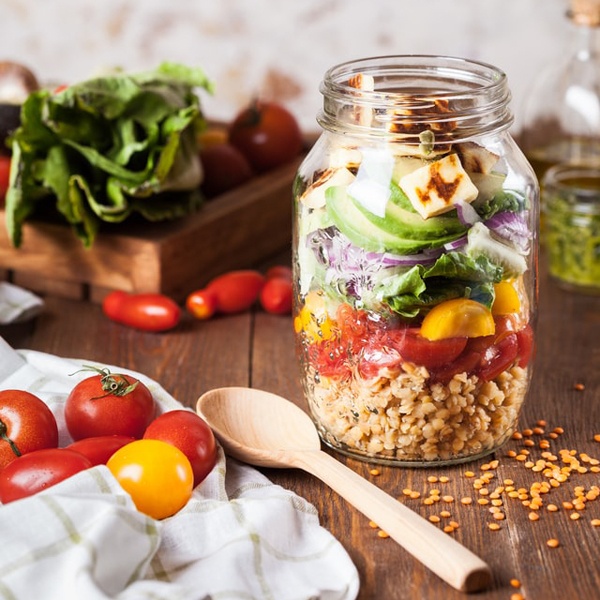Simple tips to feel better & get your gut health in check

If you’ve paid any attention to health news over the past decade, you’ve probably heard terms like gut health, probiotics, and microbiome. But what do they mean, and is gut health really important?
The answer, in short, is yes, absolutely! But it’s more complicated than that, so let’s simplify it a bit. Gut health is a critical component of our overall health. The entire body is connected, so when our gut suffers, so does our brain, skin, immune system, joints, and heart. There’s a reason medical experts sometimes refer to the gut as our second brain. And for those of you battling weight gain no matter what you try, your microbiome is likely all out of whack!
What is gut health?
I’m no gastroenterologist, so I won’t be getting into the nitty-gritty of our digestive tracts and how it connects with the human body’s various systems. But having done my fair share (and a bunch of other people’s shares) of failed cleanses, I’ve learned a lot about digestive health.
Our gastrointestinal tract (GI tract) is made up of a bunch of organs that go from our mouths to our bums. When we put food in our mouths, it travels down through the esophagus to the stomach. Acids break the food down before it twists down the small intestine, then the large intestine, before leaving the body.
The microbiome, that scientific word tossed around a lot regarding gut health, comprises the trillions of microbes that live in our bodies. These microbes, also called flora, are bacteria that aid in our digestion, protect our immune system, and keep us in harmony. When the microbiome is imbalanced, there are more “bad” bacteria than good hanging around in our bodies. Simply put, we aren’t in optimal health.
Why should we care about our gut?
Humans are adaptable beings. While this can be a fantastic evolutionary trait, it isn’t always a good thing. We learn to deal with pain and discomfort. We assume our bodies are genetically susceptible to things like flaky skin, irritable bowel syndrome, and contracting strep throat several times a year (which used to be my life every winter!). You feel normal, so do you even have an imbalanced microbiome? Isn’t this just the way your body is?
No, girlfriend, no. These are signs of inflammation, and they are totally not normal. But I’ve been in your shoes and know it’s easy to chalk it up to this is just the way I’m made. Without recognizing these as signs your body is giving you to tell you something is not right, you could put yourself at long-term risk for disease.
Being raised as an American, I know our culture is partially to blame. We are always rushing, which means we satisfy our hunger in quick bursts. Often this means shoving processed or pre-packaged foods in our mouths while we shove kids in their car seats so we can get where we need to go. This puts our bodies under constant stress for a couple of reasons.
- One, we overeat a lot.
- Two, we aren’t always eating the right foods that our microbiome needs for balance.
We don’t even realize the damage we’re doing! This stress causes weight gain because our bodies cannot process the intake quickly enough to push out the waste. The way many of us live is a significant contributor to the fact that pancreatic and colon cancer numbers are rising.
Don’t be alarmed if you’ve been feeling bloated or just blah lately. With knowledge comes power. And there are things you can start now to balance your microbiome and feel more energy.
But first, let’s identify our body’s warning signals.

Signs of an unbalanced gut
Learn the telltales that accompany poor gut health. Some of them are small and unnoticeable, made almost insignificant because so many people suffer from them. Ask yourself the following questions, and if you answer yes to more than a couple, chances are you’ve got some work to do in the gut balancing department.
- Are you constantly bloated and/or mildly constipated? – When our digestive system struggles to break down food efficiently, it lets us know by trapping gases. Think of it as a traffic jam due to slow drivers. When things aren’t moving, you won’t be pooping. And here’s the scoop on poop — you should go at least every other day. Optimal would be daily. Just like babies, when they eat, they poop – big people are no different, my friend.
- Is your IBS out of control? – Irritable bowel syndrome, or IBS, is incredibly painful and comes with an intense feeling of bloating. It occurs when the negative bacteria in the large intestine overpower the good. Food in the GI tract can cause diarrhea and an instant need to find a restroom.
- Do you get sick a lot? – We all catch a common cold every once in a while. We are human. But if you notice you’re continually fighting off a virus, infection, or even year-round allergies, your gut health may be imbalanced.
- Are your breakouts worse than when you went through puberty? – This is a big one for me. When I’ve been eating like crap, my skin tells the world. Your biggest organ wears the state of your health on the outside. If you’ve noticed you’re breaking out with those painful cystic pimples, particularly around the mouth, but also have dry, flaky skin, something is off. (Side note: the Primally Pure facial brush is amazing for combatting this annoying skin paradox.)
- Do you get a lot of headaches? – Migraines and frequent headaches go hand-in-hand with GI issues. Certain foods can trigger a headache, so pay attention to what you’re eating and drinking before headaches to narrow down the culprit.
- Are you super anxious or feeling depressed? – Inflammation in the gut can cause mental health issues, even though it usually isn’t the first thing we target. Medical experts and scientists call this link the gut-brain axis.
Get your gut in check.
You don’t necessarily need an extreme cleanse to restore your gut health. I struggle to stick to food cleanses, so I rarely recommend them. In my experience, I do okay for a day or two but end up pigging out on everything in sight because I’ve starved myself. I suck at true cleanses. But if it works for you, great! There are other simple diet changes that don’t involve a hardcore cleanse and can naturally improve your microbiome state. It just takes more food mindfulness and steering away from certain foods and habits. Here are a few tips:
- Eat the rainbow – Getting a diverse range of fruits and vegetables is essential for a healthy microbiome. The easiest way to make sure you’re consuming the nutrients you need is to eat colorful foods at every meal.
- Fresh or frozen over processed – Skip the processed foods, like fast food, lunch meats, canned and boxed foods. Shop the outside perimeter of the store and make meals simple! If you have ever been on a cleanse, the first to go is the overly processed lunch meats. Go easy on smoked meats, cook well to release the salts, and such done in that process. If you have smoked ham on Sunday, try chicken Monday and maybe fish on Tuesday before tossing in another smoked meat on your menu.
- Consider a probiotic – When I know my body is off, I like to jumpstart my gut health with Pure probiotics. There are a lot of probiotic options on the market. Whichever you choose, make it has multiple strains of bacteria and at least 10 million CFU’s.
- Focus on fiber – High-fiber foods like whole grains, fruits, veggies, and legumes are the best way to reduce inflammation and rebuild a healthy microbiome. Fiber will also make sure you stay regulated (aka pooping daily).
- Stay hydrated – Water is one of the most powerfully simple ways to rid our bodies of toxins and restore balance. Shoot for consuming half your weight in water ounces. For easy mental math, say you weigh 100 lbs. You need to down 50 ounces of water throughout the day. I used to buy into the common misconception that the more water, the better. But then I noticed I was flushing out the essential nutrients I was consuming in my supplements and diet. How’d I know? Because I pay attention to my pee color. And you should, too! TIP – Add electrolyte drops to your water from time to time. This gives peace of mind that you’re hydrating and not flushing out all the good stuff.
- Try fermented foods – This doesn’t mean you have to force yourself to drink kombucha or eat sauerkraut and kimchi—although if you like that stuff, they’re excellent sources of probiotics. Yogurt with active cultures is a great snack or breakfast to help your and your kids’ digestion. When choosing yogurt brands, pay attention to the added sugars on the label and shoot for Greek yogurts without fruit blends. Instead, add fresh fruit and granola yourself. This time of year, this is one of my most favorite things. It’s so refreshing!
- Limit sugar and avoid certain sugar alternatives – Sugar and some alternatives actually feed the bad bacteria in our body, which increases inflammation. Get your sweet from natural sources, like fruit and honey. While less fun, this also means watching alcohol consumption.
- Be careful with antibiotics – If you’re one of those people who get sick a few times a year, the antibiotics may do more damage than you think. Antibiotics cause drastic changes to our microbiome, and continued use can cause a wide imbalance between healthy and unhealthy bacteria. This is why sometimes we experience stomach discomfort when we take them. After you have finished your dose, follow up with probiotics to help get yourself balanced again.
- Take your time eating – As difficult as it is to eat slowly when you’re bouncing between ball games, swimming lessons, work, and every other place you need to be, it’s important for your gut health to take your time. When we eat fast, we overeat, which puts a strain on our digestive tract. Pair this with eating overly processed food, and you’ve got a double dose of impending gut disaster.

Awareness is the first step.
The human body is a complex machine, and I don’t have it all the way figured out. But once I started paying attention to my second brain, I noticed a big difference in how my body felt on the inside. I’m less bloated, get sick way less, and just feel good in my skin. My knees even hurt less after a run! It now seems silly that I took so much care of the machines around my house (furnace, for example – I never miss a service check-up or forget to change the filter!), but I was treating my own machine like garbage.
This is just a glimpse into the fascinating topic of gut health. There is so much more to it. But becoming aware of how the food you eat and your overall lifestyle contributes to a balanced or imbalanced microbiome is the first step in becoming a healthier you.
I want to leave you with a challenge: think about how you can implement one of these tips into your daily routine. As it becomes a habit, add another one. I guarantee you’ll notice a difference when you make your gut happier.

By Category
Don't Miss Out!
Sign up to get Mental Edits delivered to your inbox
Primally Pure
Recently on the

blog
My Awakening Journey could be an Inspiration for You!!
Why is it Important to Read Food Labels Before Buying Them?
Chiropractor Care for Gut Health
Soak in more memories during mealtime
Snag My Meal Planner Sanity Saver
Expand your time & your sanity with your family using a simple guide to plan out your meals. Using my foolproof steps to guide you through writing out a weekly menu building in meals that fuels you and your family, reduce your weeknight stress, and build a grocery list within minutes. Check, check!




